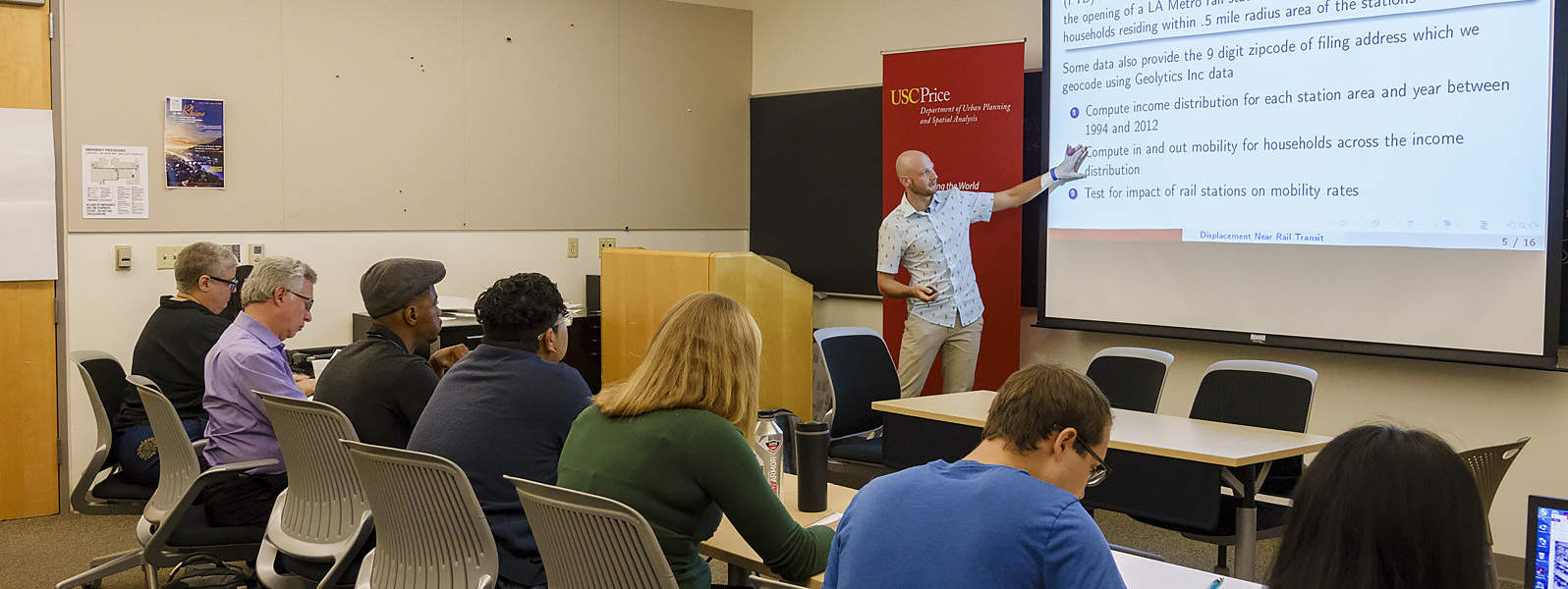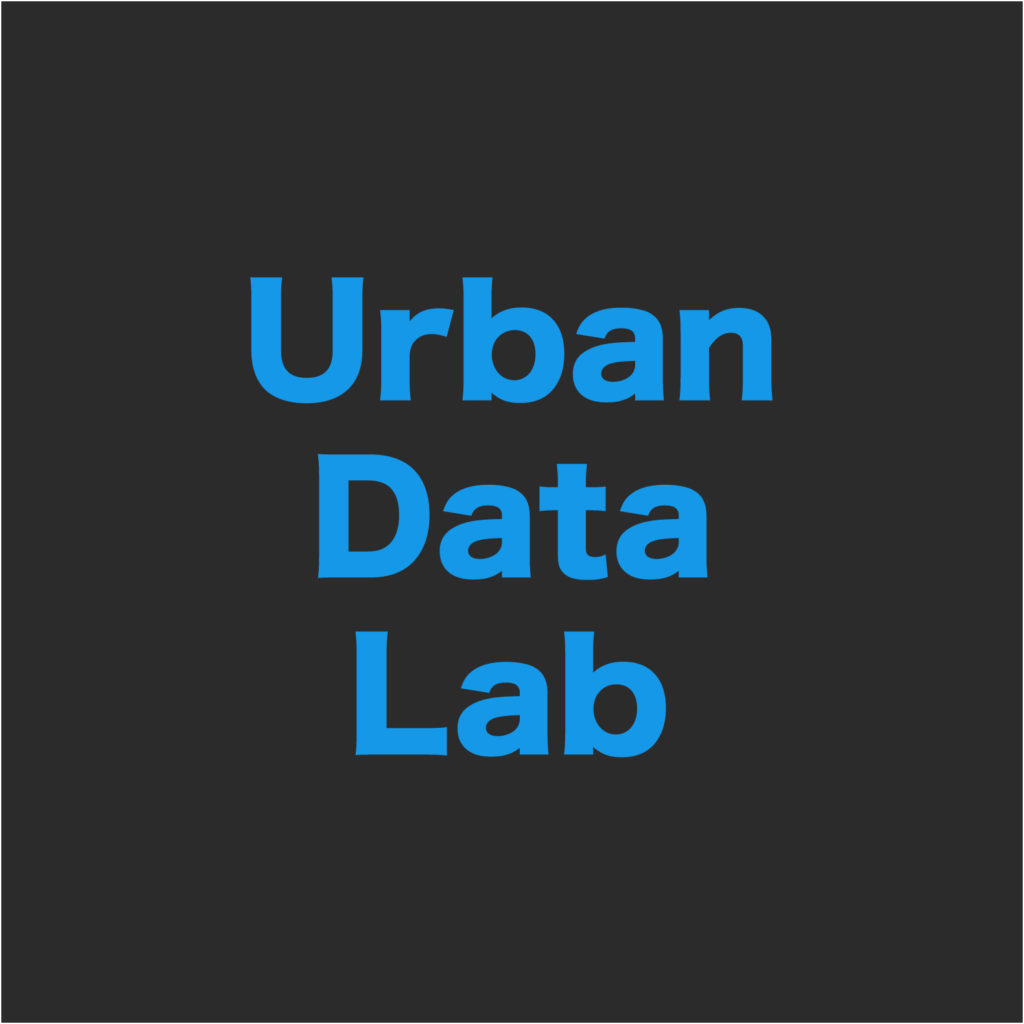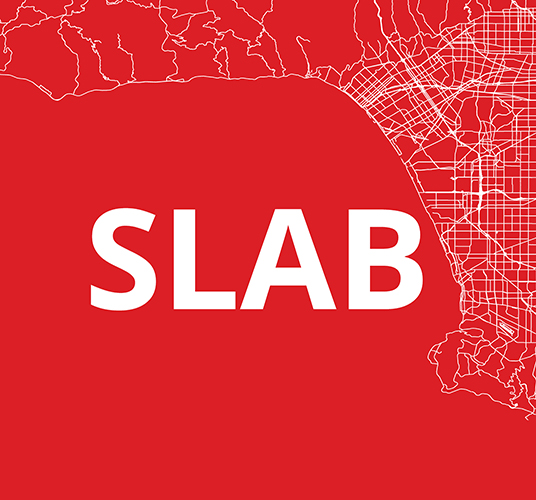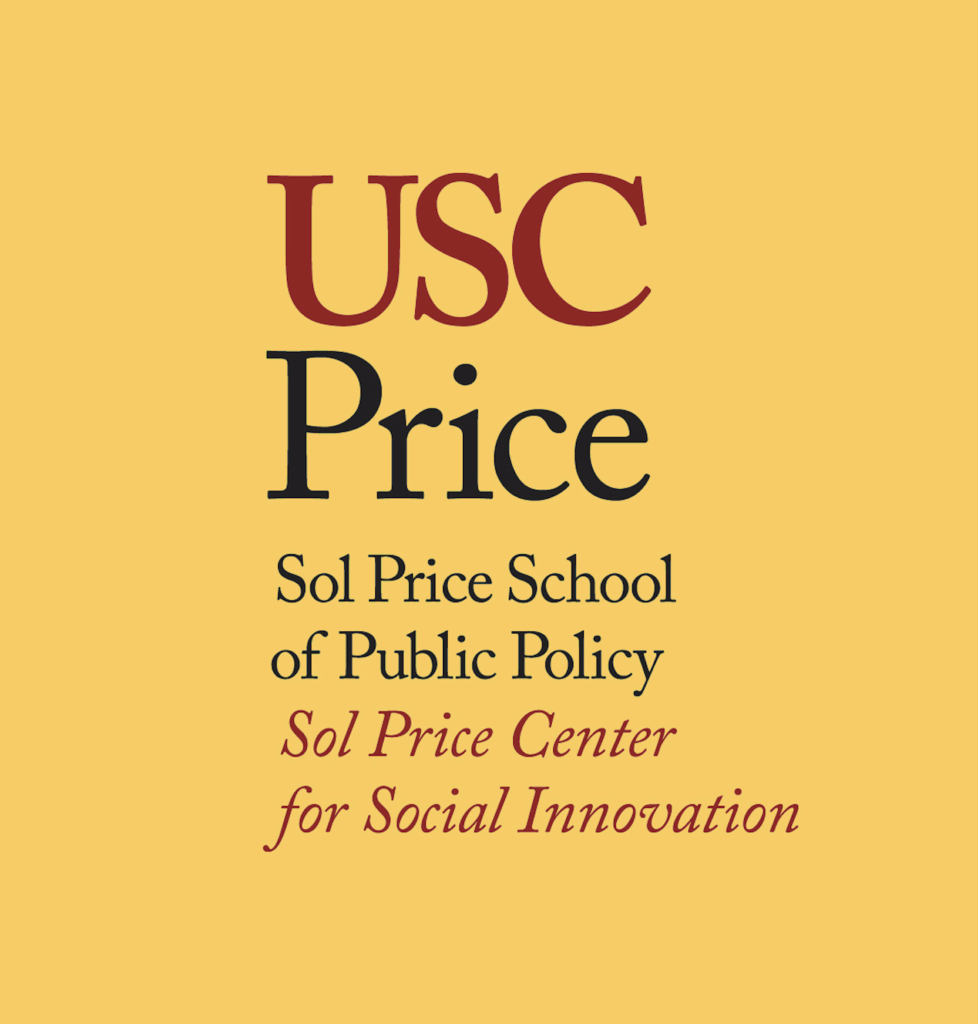John Romley, Ph.D.
Associate Professor of Public Policy and Pharmaceutical & Health Economics
Faculty Director, PhD Programs
For admissions information, please email [email protected]
Fields of Study
Through advanced theoretical core courses in critical thinking, planning theory, urban development, and research methodology, Ph.D. in Urban Planning and Development students gain a strong foundation from which to launch their scholarly career and develop an area of expertise.
Working closely with faculty mentors, Ph.D. in Urban Planning and Development students focus on and develop substantive expertise in core areas that leverage the Price School’s renowned research strengths in fields such as:
- Arts, culture, and community development
- Climate change and sustainability
- Data science and spatial analysis
- Demography
- Housing
- Land use and urban design
- Planning theory and social justice
- Real Estate
- Transportation and Mobility
Funding
All Ph.D. students are supported for four years through a combination of fellowships and graduate assistantships that provides year-round full tuition, a competitive stipend, and health and dental insurance. Students beyond their fourth year obtain support through teaching or research assistantships, or funding from USC and/or outside sources. Ph.D. students have access to stipends for conference travel.
Learn more about funding »
Research in a Supportive Environment
Price School faculty mentor Ph.D. students to contribute to the scholarly foundations of their chosen field. Many Ph.D. students publish and present their work at conferences, often co-authoring papers with faculty.
Recent Ph.D. Student Publications
Arthur Acolin, J. Bricker, P.S. Calem, and S.M. Wachter (2016). A Renter or Homeowner Nation? 18.1: 145-157.
Arthur Acolin and Annette M. Kim. (2021). Algorithmic justice and groundtruthing the remote mapping of informal settlements: The example of Ho Chi Minh City’s periphery. Environment and Planning B: Urban Analytics and City Science. 2022;49(1):151-168. doi:10.1177/2399808321998708
Cynthia Barboza-Wilkes, Bill Resh, and Carmen Mooradian (2020). Unpaid Work? Emotional Labor Assessments and Episodic Recall Bias in Public Engagement, Journal of Behavioral Public Administration, Vol. 3(2), 1-11.
Yi Chen, Bryan Tysinger, Eileen Crimmins, and Julie Zissimopoulos (2019). Analysis of Dementia in the US Population Using Medicare Claims: Insights from Linked Survey and Administrative Claims Data, Alzheimer’s & Dementia: Translational Research & Clinical Interventions, Vol 5(1), 197-207.
Jonathan Crisman and Annette M. Kim, (2019). Property Outlaws in the Southland: The Potentials and Limits of Guerrilla Urbanism in the Cases of Arts Gentrification in Boyle Heights and Street Vending Decriminalization in Los Angeles. Urban Design International. 24: 159-170. https://doi.org/10.1057/s41289-019-00086-6
Julia Harten, Annette M. Kim, & Cressica Brazier. (2020). Real and fake data in Shanghai’s informal rental housing market: Groundtruthing data scraped from the internet. Urban Studies, 58(9), 1831–1845. https://doi-org.libproxy1.usc.edu/10.1177/0042098020918196
Andy Hong and Lisa Schweitzer, L. Marr, and W. Yang (2015). Impact of Temporary Freeway Closure on Regional Air Quality: A Lesson from Carmageddon in Los Angeles. Environmental Science and Technology, 49(5): 3211-3218.
Hyojung Lee and Elizabeth Currid‐Halkett, & Gary D. Painter. (2019) Veblen goods and urban distinction: The economic geography of conspicuous consumption; Journal of Regional Science, 59(1): 83-117.
Matthew Miller (2015). Social Finance in Black Geographies: A Statistical Analysis of Locations in Los Angeles County. Harvard Journal of African American Public Policy, 21: 78-91.
Noah Miller, Adam Rose, Dan Wei, Toon Vandyck and Christian Flachsland (2018). Achieving Paris Climate Agreement Pledges: Alternative Designs for Linking Emissions Trading, Review of Environmental Economics and Policy, Vol. 12, No. 1: 170-182.
Maria Francesca Piazzoni (2018). The Real Fake: Authenticity and the Production of Space, Fordham University Press.
Vincent Reina and Raphael Bostic and H. Schwartz, R.K. Green, L.M. Davis, and C.H. Augustine (2015). The Preservation of Affordable Rental Housing: An Evaluation of the MacArthur Foundation’s Window of Opportunity Initiative. RAND Corporation report.
Jovanna Rosen (2016). Climate, Environmental Health Vulnerability, and Physical Planning: A Review of the Forecasting Literature. Journal of Planning Literature, 1-20.
Eun Jin Shin (2017). Ethnic Neighborhoods, Social Networks, and Inter-household Carpooling: A Comparison Across Ethnic Minority Groups, Journal of TransportGeography, Vol. 59, pp. 14–26.
Xize Wang, Marlon Boarnet, and D. Houston (2016). Can New Light Rail Reduce Personal Vehicle Carbon Emissions? A before-after, experimental-control evaluation in Los Angeles, Journal of Regional Science.
Research Centers and Opportunities
Urban Data Lab uses computational data science and spatial analysis to explore urban transportation patterns around the world, critically interrogate how big data reshapes housing affordability, and leverage technology platforms for more just, collaborative city planning.
METRANS’ mission is to solve transportation problems of large metropolitan regions through interdisciplinary research, education and outreach. With three key objectives – to foster independent, high quality research to solve the nation’s transportation problems; train the next generation transportation workforce; and disseminate information, best practices, and technology to the professional community – this partnership between USC and CSULB brings together two large urban universities with complementary strengths.
The Population Dynamics Research Group uncovers demographic trends that drive major changes in society, providing insights that lead to effective policies. These population patterns underlie areas like immigration, education, the environment, and urban growth. The Popdynamics team monitors the future using the decennial U.S. Census, the American Community Survey, and our own carefully crafted Demographic Futures projections which incorporate layers of demographic analysis and include greater detail than the census provides.
The Center for Sustainability Solutions develops policy, technological, and behavioral solutions to the most pressing sustainability problems of the Southern California region and the world. It brings together scholars and stakeholders from sustainability organizations around the world to collaborate on basic and applied research aimed at making a real-world impact
Committed to expanding the visualization of public policy and urban planning, the USC Price School launched its Spatial Analysis Lab for research. SLAB’s research experiments with developing alternative cartographies to bring attention to overlooked urban spaces and people. It also critically studies how our visual narratives interface with social institutions and public discourse.
The Sol Price Center for Social Innovation was established with the recent gift to name the USC Sol Price School of Public Policy. This new center aims to advance ideas, strategies, and practices that enhance the quality of life for people in urban communities. The center will provide opportunities for direct student engagement across all of the Price School’s primary disciplines.








